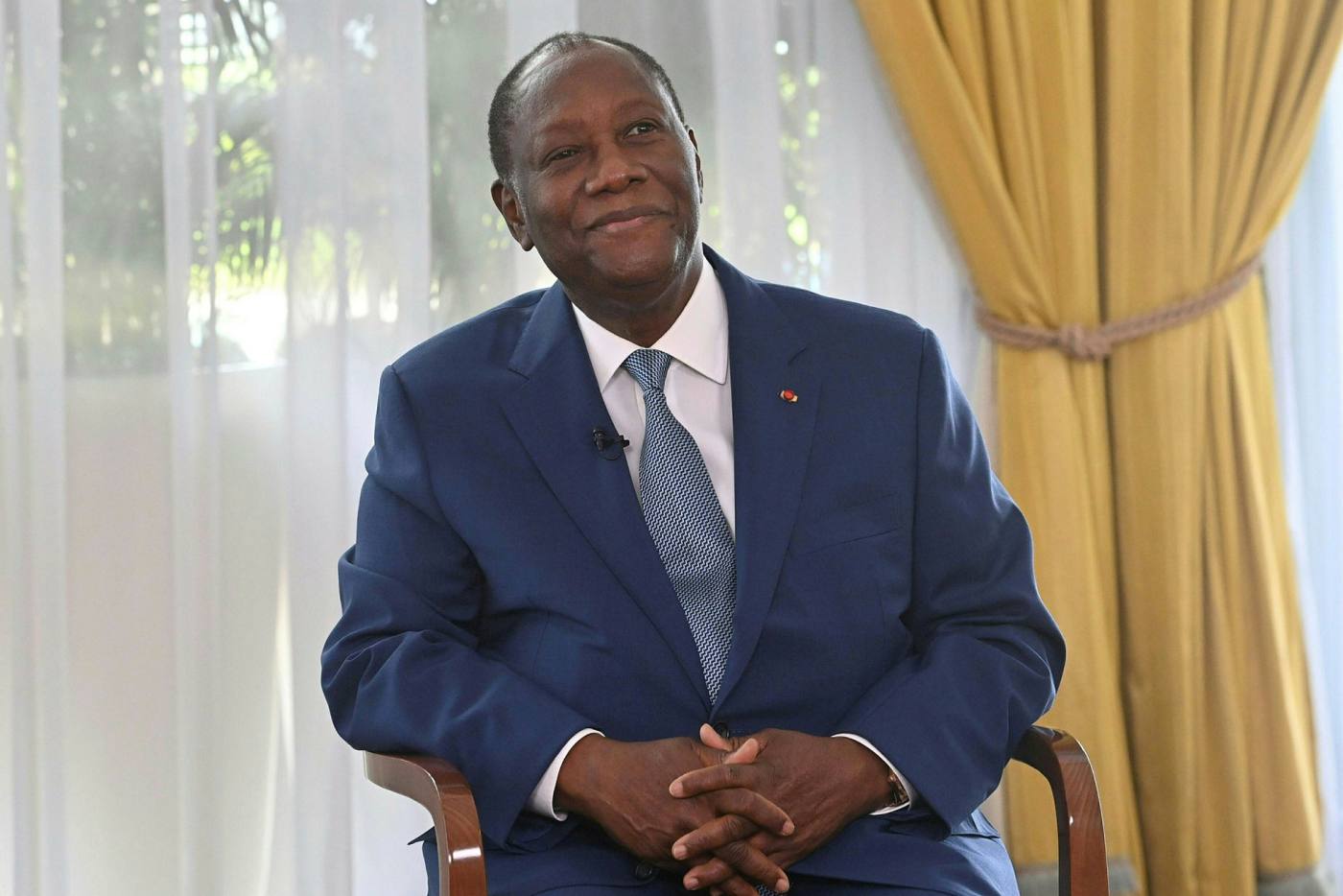尊敬的用户您好,这是来自FT中文网的温馨提示:如您对更多FT中文网的内容感兴趣,请在苹果应用商店或谷歌应用市场搜索“FT中文网”,下载FT中文网的官方应用。
Ivorians celebrated when Italian energy group Eni revealed that it had discovered up to 2bn barrels of oil in waters off the west African country’s coast — the first big find in two decades.
当意大利能源集团埃尼(Eni)透露该公司在西非国家科特迪瓦海岸附近海域发现了多达20亿桶石油时——20年来的首次大发现——科特迪瓦人欢呼雀跃。
“It’s a great discovery,” said Abdourahmane Cissé, secretary-general of the Ivorian presidency, of last month’s find. “The preliminary results show that, in terms of oil reserves, it is approximately 10 times what we have at the moment,” he said, referring to initial estimates of between 1.5bn and 2bn barrels of oil as well as between 1.8tn and 2.4tn cubic feet of associated gas.
科特迪瓦总统府秘书长Abdourahmane Cissé在谈到上个月的发现时说:“这是一个伟大的发现。”他表示:“初步结果显示,就石油储量而言,它大约是我们目前拥有的10倍。”他指的是初步估计的15亿至20亿桶石油,以及1.8万亿至2.4万亿立方英尺的伴生天然气。
Oil could start flowing within four years, boosting exports from a country that is already the world’s biggest grower of cocoa. “This will be good for the country,” said Cissé.
这些石油可能在4年内开始供应,提振这个已经是世界上最大可可种植国的出口。Cissé表示:“这将国家有利。”
But not everyone shares his confidence. Ivory Coast has struck oil just as much of the developed world has begun to call time on fossil fuels and some financial institutions are reluctant to take carbon-emitting projects on to their balance sheets.
但并不是每个人都像他一样自信。科特迪瓦开采石油之际,正值许多发达国家开始停止使用化石燃料,一些金融机构也不愿将碳排放项目纳入其资产负债表。
“People say: ‘We’ve found oil, we’ve found gas, we’re all going to get rich’,” said Kingsmill Bond, an energy strategist at think-tank Carbon Tracker. “But getting involved in extraction of fossil fuels is much riskier than it used to be and much riskier than it is perceived to be.”
“人们说:‘我们发现了石油,我们发现了天然气,我们都将变得富有。’”智库碳追踪(Carbon Tracker)的能源策略师金斯米尔•邦德(Kingsmill Bond)表示。“但参与化石燃料开采的风险比过去大得多,也比人们认为的风险大得多。”
While Ivory Coast is already pumping small quantities of oil, Bond said the risk was that it would bring more “on stream at a time when the market is already in decline”. As advanced economies made the switch to electric vehicles and moved rapidly to renewable energy, demand for oil would fall and only the lowest-cost producers would survive, he added.
尽管科特迪瓦已经在开采少量石油,但邦德表示,风险在于它将“在市场已经下行的时候”带来更多石油。他补充称,随着发达经济体转向电动汽车,并迅速转向可再生能源,对石油的需求将会下降,只有成本最低的生产商才能生存下来。
Production costs of offshore African oil, especially in deep water, were relatively high, Bond said. Ivory Coast’s discovery is at about 1,200 metres. Despite the surge in oil and gas prices this autumn, many analysts argue that declining demand will eventually force prices down, making higher-cost oil uncompetitive.
邦德说,非洲近海石油的生产成本,特别是在深水区,相对较高。科特迪瓦发现的石油在距离海面约1200米处。尽管今年秋天石油和天然气价格飙升,但许多分析家认为,需求下降最终会迫使价格下降,使开采成本较高的石油失去竞争力。
‘We’re not the polluters, the others are’
“我们不是污染国,其他国家才是”
The Ivorian find also taps into a broader debate about what it is reasonable to expect of developing countries that are reliant on fossil fuels.
科特迪瓦的发现也引发了一场更广泛的辩论,即对依赖化石燃料的发展中国家的合理预期是什么。
As the COP26 UN climate change summit in Glasgow approaches and many rich countries accelerate their shift towards clean energy, some governments in Africa — particularly hydrocarbon producers such as Nigeria and Equatorial Guinea — are calling for a “just energy transition” that allows for a slower switch to other fuels.
随着在格拉斯哥举行的COP26联合国气候变化峰会的临近和许多富国加速转向清洁能源,一些非洲国家政府——特别是尼日利亚和赤道几内亚等碳氢化合物生产国——正在呼吁“公正的能源转型”,允许缓慢地转向其他燃料。
Governments in Africa, which are responsible for at most 3 per cent of global emissions, object to being pressured by banks and donors to abandon the fossil fuels on which they say their industrialisation and development depends. Many, including Ghana, Senegal and Mauritania, are only now gearing up their hydrocarbon production.
非洲各国政府表示,其工业化和发展依赖化石燃料,反对受到银行和捐助方的压力,要求它们放弃化石燃料。非洲各国的排放量最多只占全球排放量的3%。包括加纳、塞内加尔和毛里塔尼亚在内的许多国家现在才开始加快碳氢化合物的生产。
“We’re going to do what is in the interests of our country,” said Alassane Ouattara, president of Ivory Coast, in an interview, adding that Abidjan intended to exploit its hydrocarbons for the benefit of its people.
科特迪瓦总统阿拉萨内•瓦塔拉(Alassane Ouattara)在接受采访时说:“我们将做符合我们国家利益的事情。”他还说,阿比让打算开发本国的碳氢化合物,为本国人民谋福利。
Countries such as the US, where carbon emissions were nearly 40 times higher per capita than in Ivory Coast, were in no position to lecture, he said. “We are not the polluters. The others are,” he added.
他表示,人均碳排放量是科特迪瓦近40倍的美国等国家没有资格说教。“我们不是污染国。其他国家才是。”他补充道。

科特迪瓦总统阿拉萨内•瓦塔拉:我们将做符合我们国家利益的事情。
Powering the nation: ‘We will need gas’
为国家提供动力:“我们需要天然气”
Alessandro Puliti, Eni’s chief operating officer for natural resources, said the Ivorian discovery met the Italian company’s criteria for investment. This was partly because the associated gas could be fed into existing infrastructure that already supplied Ivory Coast with 60 per cent of its electricity, he said.
埃尼负责自然资源的首席运营官亚历山德罗•普利蒂(Alessandro Puliti)表示,科特迪瓦的发现符合该意大利公司的投资标准。他表示,这部分是因为相关天然气可以输送到现有的基础设施中,而这些基础设施已经为科特迪瓦提供了该国60%的电力。
In Ivory Coast, a relatively high three-quarters of people have electricity and it has one of west Africa’s most reliable power grids. It exports electricity to Ghana, Mali, Benin, Togo and Burkina Faso.
在象牙海岸,有相对较高的四分之三的人口可以获得电力,该国拥有西非最可靠的电网之一。该国还向加纳、马里、贝宁、多哥和布基纳法索出口电力。
Energy minister Thomas Camara said that by 2030 the Ivorian government intended to increase the mix of renewable energy — currently entirely hydro — from 40 per cent to 42 per cent of a much larger energy pie.
能源部长托马斯•卡马拉表示,到2030年,科特迪瓦政府打算将可再生能源(目前完全是水电)的比重从40%提高到42%。
There were plans to add solar, including from a floating solar farm on a lake, as well as biomass energy made from waste in the palm oil and cocoa industries, he said. “But we envisage our energy needs will go up significantly by 2030 and for that we will need gas.”
他说,计划增加太阳能,包括一个漂浮在湖上的太阳能农场,以及从棕榈油和可可行业废料中生产的生物质能。“但我们预计,到2030年,我们的能源需求将大幅上升,为此,我们将需要天然气。”
Africa without oil?
没有石油的非洲?
There was a danger the world was transitioning towards green energy without taking into account the huge development needs in Africa and other poorer regions, said Kenny Fihla, chief executive of wholesale clients at Standard Bank, Africa’s biggest lender.
非洲最大银行标准银行(Standard Bank)批发客户业务首席执行官肯尼•费拉(Kenny Fihla)表示:“存在一种危险,即世界正在向绿色能源过渡,却没有考虑到非洲和其他较贫穷地区的巨大发展需求。”
Older petrol and diesel vehicles would be on the road much longer in Africa, where most countries relied on second-hand imports for the bulk of their fleet, he added.
他补充称,在非洲,老式汽油和柴油车的行驶时间将长得多,非洲大多数国家的车队都依赖二手进口。
“It is nearly impossible to talk about Africa without oil at this stage,” he said. “Even in 2050, there will still be some oil utilisation, as other types of fuel will not have developed adequately to be able to replace it.”
他表示:“现阶段谈论没有石油的非洲几乎是不可能的。即使到2050年,仍将要使用一部分石油,因为其他类型的燃料届时也不会发展到能够取代石油的程度。”
Bond from Carbon Tracker urged African governments to look with more urgency at developing solar and wind power which, he said, would prove to be both more abundant and cheaper than fossil fuels.
碳追踪的邦德敦促非洲各国政府更加迫切地发展太阳能和风能,他说,这两种能源将被证明比化石燃料更丰富、更便宜。
“The way I see it, it is really daft to advise people to invest in the dying technology of fossil fuels when we ourselves are moving to far superior renewable technologies,” he said. “Africa missed out on the fossil fuel-driven energy system and all the wealth that flowed from that. But they don’t need to miss out on this one.”
他说:“在我看来,当我们自己正在转向更先进的可再生技术时,却建议人们投资正在消亡的化石燃料技术,这真的是愚蠢的。非洲错过了化石燃料驱动的能源系统以及由此产生的所有财富。但他们没必要错过这次机会。”
Still, in the interim, Ivory Coast was not about to let its big oil find go to waste, said Cissé. Asked if he thought developers would have any difficulty with securing bank lending to develop the oilfield, he said: “Now they’ve found it, trust me, there won’t be any issues of financing.”
不过,Cissé表示,在此期间,科特迪瓦不会让本国的大型石油发现白白浪费掉。当被问及他是否认为开发商在获得银行贷款开发油田方面会有困难时,他表示:“现在他们已经找到了,相信我,不会有任何融资问题。”